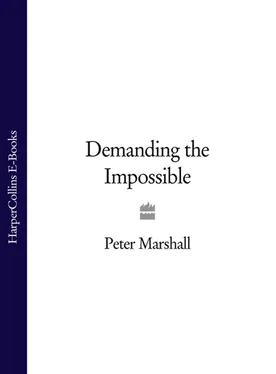William Morris was to revive A Dream of John Ball (1888) five hundred years later. The English Peasants’ Revolt was based on the myth of a Golden Age, but in due course the Revolt itself took on the power of myth. Some of the anarchist participants in the anti-Poll Tax riots in London in 1990, for instance, were conscious of this earlier revolt against unjust taxation.
Despite Richard II’s rearguard action, kings throughout Europe were unable to prevent feudalism from collapsing any more than the Church could stem the rising tide of the Reformation. After the Peasants’ Revolt in England, the most anarchic insurrection took place in Bohemia in the following century in 1419. It was part of a rebellion initially provoked by the execution of Jan Hus, a moderate reformer who had attacked the abuses of the church. He had also defended the British Protestant John Wycliffe who had argued that the Church would be better served without a pope and prelates. Wycliffe had declared in resounding Latin:
Firstly, that all good things of God ought to be common. The proof of this is as follows. Every man ought to be in a state of grace; if he is in a state of grace he is lord of the world and all it contains; therefore every man ought to be the lord of the whole world. But because of the multitudes of men, this will not happen unless they all hold all things in common: therefore all things ought to be in common.
During the unrest which followed in Bohemia, the insurgents called themselves Taborites after having given the biblical name Tabor to a town on a hill near Prague. They tried to establish an anarcho-communist order in which there was to be no private property or taxes and no human authority of any sort. They took the Bible as the sole authority for their faith and practice. They insisted that ‘All shall live together as brothers, none shall be subject to another.’ While calling for popular democracy, they still accepted the ultimate authority of God: ‘The Lord shall reign, and the Kingdom shall be handed over to the people of the earth.’ 12 They were extreme millenarians, believing that the Second Coming of Christ (disguised as a brigand) was imminent. All laws would then be abolished, the elect would never die, and women would bear children painlessly. Some even began acting as if the millennium had already arrived, wandering through the woods naked, singing and dancing; they claimed that they were in state of innocence like Adam and Eve before the Fall.
The Taborites set up communal chests and shared their wealth equally amongst themselves. Although their economic system has been called a communism of consumption, there is some evidence that they socialized production. 13 But they were unable to organize production on a large scale, or to exchange goods efficiently between the city and peasant communes. When their wealth ran out, they began to take from the neighbouring people. The experiment collapsed after a couple of years. Nevertheless, it has been called the first attempt to found a society on the principle that liberty is the mother and not the daughter of order. 14
The Taborites were ready to fight. They called for a warrior Christ to make war on the Antichrist in Babylon, and declared: ‘All lords, nobles and knights shall be cut down and exterminated in the forests like outlaws.’ 15 Some however objected to such violence and withdrew under the guidance of Peter Chelšický to rural Bohemia to found a community of pacifists. He lamented how so-called servants of God carried the sword and committed ‘all sorts of injustice, violence, robbery, oppression of the labouring poor … Thereby all brotherly love is infiltrated with bloodlust and such tension created as easily leads to contest, and murder results.’ Satan had seduced them into thinking that they were angels who must purify Christ’s world of all scandals and judge the world; the result was that they ‘committed many killings and impoverished many people’. 16
In his principal work, The Net of Faith ( c .1450), Peter Chelčický opposed the ‘two whales’ of the Church and State. He believed that the State and political power were the result of original sin, and were necessary evils to keep order in an unregenerate world. But in any true community of Christians they were superfluous; love and peace would suffice. The community Chelĉický founded had no outward organization, and was held together only by love and by following the example of Christ and his apostles. The sect eventually became the Moravian Brothers. Rudolf Rocker later recognized Chelĉický as a forerunner of Tolstoy, and Kropotkin acknowledged him as a precursor of anarchism. 17
The Reformation, set in motion by the great reformers Luther, Zwingli and Calvin, unleashed forces which were difficult for the Church and State to control. It coincided with the breakup of the hierarchical feudal order with its network of rights and obligations, and freed the economy to competition and usury. The reformers’ appeal to the Bible and their insistence of salvation by faith and predestination had enormous consequences. In the three score years following Luther’s three great Reformation tracts of 1520, a tremendous movement at the core of Christendom got underway which has been called the radical Reformation. It marked a ‘radical break from existing institutions and theologies in the interrelated drives to restore Christian Christianity, to reconstruct and to sublimate’. 18 It consisted of a loose movement of Anabaptists (who believed in adult baptism), Spiritualists (who stressed the divine immediacy), and Evangelical Rationalists. They believed on principle in the separation of the Church from the State, sought to spread their version of the Christian life through missions, martyrdom and philanthropy, and rejected all forms of coercion except the ban. They had an antinomian streak which in its mildest form meant a stress on grace over law, but in a more pronounced form led to the repudiation of all organization and ordinances in church life.
The Anabaptists in the sixteenth century were in many ways successors to the Brotherhood of the Free Spirit, cultivating brotherly love and sharing their goods. They regarded the State with suspicion, considering it irrelevant to true Christians like themselves. They refused to hold official positions in the State or to take up arms on its behalf. Although they were millenarians in that they looked forward to the coming of the Kingdom of God, they were prepared to wait for its arrival. They were mostly pacifists.
This was not the case of Thomas Münzer who opposed Luther in Germany at the time of the Peasants’ Revolt. The peasants were looking forward to a society of independent yeoman farmers and free labourers as well as a return to their common rights in land. Luther, who indirectly helped to provoke the unrest, came to defend the rulers who were introducing the new serfdom. ‘The only way to make Mr Everyman do what he ought’, he declared, ‘is to constrain him by law and the sword to a semblance of piety, as one holds wild beasts by chains and cages.’ 19
In 1523, Thomas Münzer began organizing in secret a revolutionary army called the League of the Elect. Basing his vision on the apocalyptic Book of Daniel, he announced the immediate coming of the war between the forces of the Devil and the League of the Elect which would usher in the millennium. Taking the town of Mühlhausen in Thuringia, he made it his base and attracted support from the peasants. Because of Engels’ praise of Münzer in The Peasants’ War in Germany (1850), he has become a Marxist revolutionary saint, but in fact he only called for a community of goods in the last days at Mühlhausen and he ran away from the final battle in 1525 at Frakenhausen in which the peasant army was defeated.
Читать дальше












